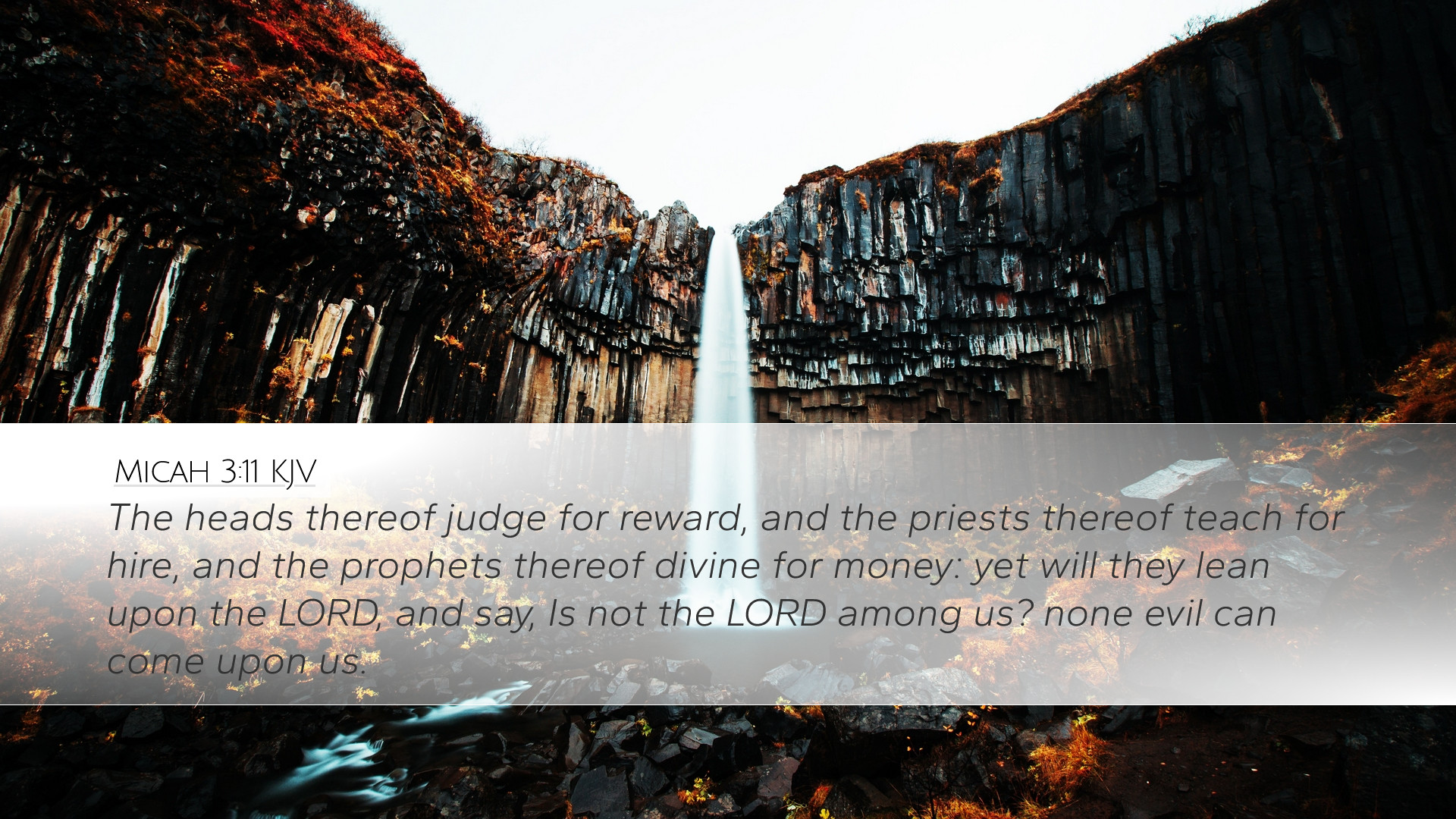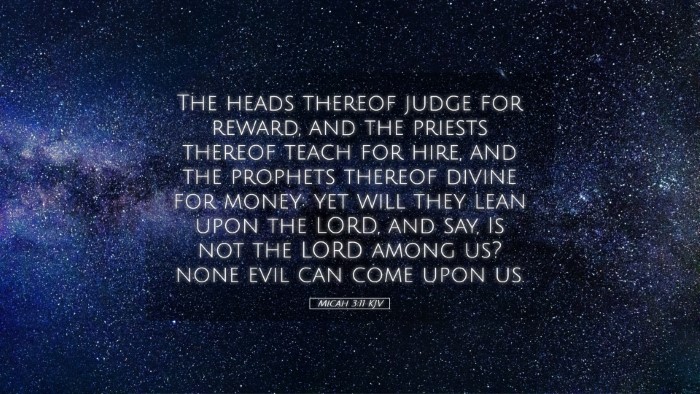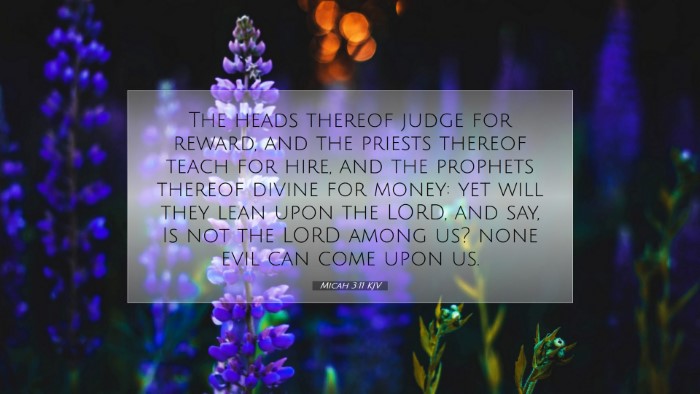Old Testament
Genesis Exodus Leviticus Numbers Deuteronomy Joshua Judges Ruth 1 Samuel 2 Samuel 1 Kings 2 Kings 1 Chronicles 2 Chronicles Ezra Nehemiah Esther Job Psalms Proverbs Ecclesiastes Song of Solomon Isaiah Jeremiah Lamentations Ezekiel Daniel Hosea Joel Amos Obadiah Jonah Micah Nahum Habakkuk Zephaniah Haggai Zechariah MalachiMicah 3:11
Micah 3:11 KJV
The heads thereof judge for reward, and the priests thereof teach for hire, and the prophets thereof divine for money: yet will they lean upon the LORD, and say, Is not the LORD among us? none evil can come upon us.
Micah 3:11 Bible Commentary
Bible Commentary on Micah 3:11
Micah 3:11 states:
"Her heads judge for reward, and her priests teach for hire, and her prophets divine for money: yet will they lean upon the LORD, and say, Is not the LORD among us? none evil can come upon us."
Introduction
This poignant verse encapsulates the profound moral and spiritual corruption present among the leaders of Israel during Micah's time. The passage critiques the corrupt practices of those in authority—judges, priests, and prophets—highlighting their motivations rooted in greed rather than divine righteousness. This commentary aims to provide insights from renowned biblical scholars, drawing upon public domain commentaries to offer a comprehensive reflection suited for pastors, students, theologians, and biblical scholars.
Context and Background
Micah was a prophet during a tumultuous time in the history of Israel, specifically in the 8th century B.C. His prophecies addressed the impending judgment of God due to the rampant immorality and injustice among the people, especially in cities like Jerusalem. Understanding the socio-political and religious climate of Israel is crucial for interpreting Micah 3:11.
Religious leaders, including judges and priests, were expected to uphold justice and guide the nation in its spiritual practices. However, as Micah points out, many were compromised by personal gain. The passage reflects a broader theme in Micah's prophecy concerning the failure of leadership within Israel, a theme echoed throughout the prophetic literature in the Hebrew Bible.
Analysis of Key Phrases
- “Her heads judge for reward”: This phrase refers to the political leaders whose justice is bought and sold. Matthew Henry emphasizes the idea that judges should pursue justice, but the reality depicted here shows them as corrupted by bribery and favoritism.
- “Her priests teach for hire”: This critique extends to the religious leaders. Albert Barnes notes that the priests, tasked with the sacred duty of teaching God’s law, have commodified their role, prioritizing financial incentive over spiritual truth. This commercialization of faith results in shallow instruction devoid of divine authority.
- “Her prophets divine for money”: Adam Clarke highlights that the prophetic office has been polluted by greed. Prophets, meant to be messengers of God, are instead prophesying based on what will earn them money. This undermines the credibility and authenticity of their divine declarations.
- “yet will they lean upon the LORD”: Despite their corrupt practices, the leaders maintain a semblance of faith in the Lord. This paradoxical assurance suggests a misplaced confidence in God’s protection despite their moral failings. It showcases a disconnection between their actions and true faith.
- “Is not the LORD among us? none evil can come upon us”: This statement reflects the false security the leaders derive from their perceived favor with God. Matthew Henry points out that such presumption leads to complacency and moral decay, as the leaders fail to recognize the consequences of their actions. They erroneously believe that God will overlook their transgressions.
Theological Implications
This verse presents significant theological implications regarding leadership, accountability, and the character of God. The corruption of judges and priests signifies a breach of covenant responsibilities, where leaders are meant to reflect God's justice and holiness. The apparent confidence in God while living in sin presents a stark warning about the nature of true faith.
- Divine Justice: The verse portrays God's stance on injustice. While leaders may think they are safe due to their positions, God's judgment is inescapable. Micah’s message underscores that divine justice will prevail, regardless of human corruption.
- True Faith vs. Presumption: The leaders exhibited an unhealthy presumption about their relationship with God. This demonstrates a critical theological lesson about faith—true faith manifests in obedience and moral integrity, rather than mere verbal affirmations.
- The Role of Prophets: The integrity of prophetic ministry is of utmost importance. The perversion of the prophetic office for financial gain not only harms individual leaders but undermines communal faith. God’s message must be delivered with fidelity to His will and character.
Application for Today
The issues addressed in Micah 3:11 resonate profoundly in contemporary contexts. Leaders in churches, communities, and nations still turn easily to practices that prioritize personal gain over integrity and divine calling. This commentary encourages current leaders and believers to examine their motives and actions in light of Micah's warnings.
- Integrity in Leadership: Today, religious and secular leaders are called to a higher standard of accountability. It is essential to act with integrity, ensuring that their decisions reflect God’s justice and love.
- Prioritizing God’s Truth: Teaching and prophetic ministry must be grounded in the truth of Scripture rather than the whims of popular opinion or financial gain. Pastors and teachers should commit themselves to studying Scripture deeply and conveying its message faithfully.
- Beware of Presumption: Just as the leaders of Micah’s time were presumptuous about God’s favor, modern believers must guard against a superficial faith that assumes God’s blessings despite unrepentant sin. Regular self-examination and accountability are vital in maintaining a right relationship with God.
Conclusion
Micah 3:11 serves as a cautionary tale regarding the dangers of corruption and complacency among leaders and the importance of integrity in prophetic ministry. By reflecting on the insights provided by historical commentaries and applying their teachings today, believers and leaders alike can strive for a faith that is not only proclaimed but is also lived, reflecting God’s justice and truth in every sphere of life.


